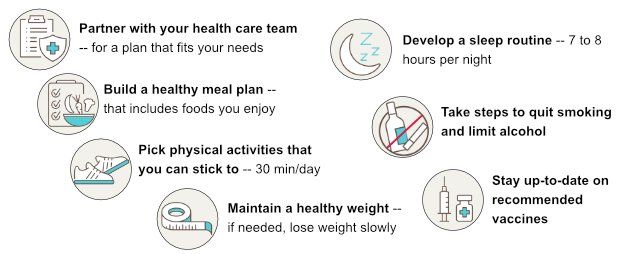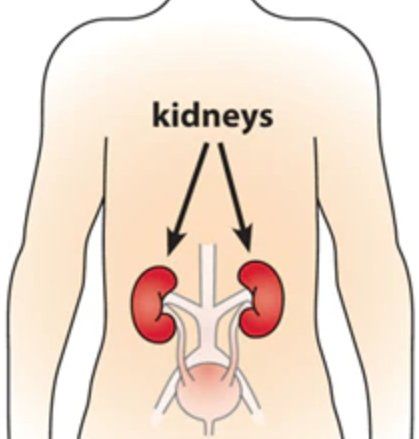National Kidney Month
Image Credit: U.S. National Institute of Diabetes and Digestive and Kidney Diseases
Introducing... your kidneys
We generally know that our kidneys filter waste and produce urine, but they do much more than that! Bean-shaped and about the size of a fist, located justed below the rib cage and on each side of our spine, healthy kidneys:
- Filter about half a cup of blood every minute, removing wastes and extra water to make urine;
- Remove acid that is produced by the cells of our body, thus regulating the pH of our blood;
- Maintain a healthy balance of water, salts, and minerals - such as sodium, calcium, phosphorus, and potasium - in our blood. This balance is necessary for our nerves, muscles, and other tissues to work normally; and
- Make hormones that help to:
- control our blood pressure,
- make red blood cells (they deliver oxygen to different parts of our body), and
- keep our bones strong.
But what can go wrong?
Kidney Stones
When there is too much waste in the blood and the body is not producing enough urine, crystals begin to form in the kidneys. These crystals attract other wastes and chemicals to form a solid object, a kidney stone, that will get larger unless it is passed out of the body in urine.
Kidney stones can be as small as a grain of sand or as large as a golf ball.
Passing kidney stones can be quite painful, but the stones usually cause no permanent damage if they're recognized in a timely fashion. Depending on the particular situation, a person with kidney stones may need nothing more than to take pain medication and drink lots of water to pass a kidney stone. Other situations may necessitate surgery; for example, if stones become lodged in the urinary tract, if they are associated with a urinary infection, or if they cause complications.
Chronic Kidney Disease
Kidneys can get damaged and not filter waste and extra fluids as they should. When this happens over time, it is called Chronic Kidney Disease (CKD). In the early stages (Stages 1–3) of CKD, the kidneys are still able to filter waste out of our blood. In the later stages (Stages 4–5), they must work harder to filter blood and may stop working altogether. The goal at each stage is to slow down the damage to the kidneys and keep them working as long as possible.
In Stages 4 and 5 of CKD, severe kidney damage means that they are close to not working at all or have failed. At this point, waste products build up in the body, causing major health problems. When kidneys fail, treatment options
to survive include dialysis or a kidney transplant.
Risk Factors
A person who has a family member with kidney disease, a diabetic, or a person with high blood pressure or heart disease, all have a higher chance of developing kidney disease than people without those risk factors. It doesn't mean that the person will definitely have kidney disease, but the chances of developing it are higher. As well, the risk increases with age.
While one may live 10 to 20 years on dialysis, it would entail a lifestyle that one would rather avoid. So what can we do to help keep our kidneys healthy?
The Key -- Personalized Kidney Care

Image Credit: U.S. National Institute of Diabetes and Digestive and Kidney Diseases
"An ounce of prevention...
... is worth a pound of cure", as the saying goes, and it certainly applies to keeping our kidneys performing at their peak. The good news is that putting into practice the tips above also helps with preventing and/or treating other conditions (such as high blood pressure and diabetes) so there's no reason to delay doing so!
Considering that a person can lose up to 90% of their kidney functions before experiencing any symptoms, an effective way to detect kidney disease is regular doctor's check-ups, including blood and urine tests.
Kidney Transplants
It might be comforting to know that as far as organ transplants go, kidney transplants are the most common and success rates continue to improve. On average, a kidney from a donor can last 15 to 20 years. Of course, getting a kidney transplant isn't without risks and potential complications, not to mention having to take immunosuppressive medications for life, to prevent organ rejection.
In November 2021, 90,000 patients (especially those with O or B blood types) in the U.S. were on a waiting list for a kidney transplant. For reference, it is possible to sign up to be an organ donor upon one's death, to help with the shortage of kidney donations that allow for the life-saving transplantation procedure. Click on the ARORA (Arkansas Regional Organ Recovery Agency) logo below to find out more or to sign up:
References and Additional Information:
- What the kidneys do - https://www.niddk.nih.gov/health-information/kidney-disease/kidneys-how-they-work
- Stages of Chronic Kidney Disease - https://www.kidneyfund.org/all-about-kidneys/stages-kidney-disease
- Kidney stones - https://www.kidneyfund.org/all-about-kidneys/other-kidney-problems/kidney-stones
- Kidney stones - https://www.mayoclinic.org/diseases-conditions/kidney-stones/symptoms-causes/syc-20355755
- Dialysis - https://www.kidneyfund.org/treatments/dialysis
- Dialysis - https://my.clevelandclinic.org/health/treatments/14618-dialysis
- Health plan - https://www.niddk.nih.gov/-/media/Files/Health-Information/Community-Outreach/NKM-2022/NKM2022_Flyer_English_508-Compliant.pdf
- Chronic Kidney Disease - https://www.niddk.nih.gov/health-information/kidney-disease/chronic-kidney-disease-ckd/what-is-chronic-kidney-disease
- Diagnosis - https://www.worldkidneyday.org/facts/chronic-kidney-disease/
- Reduce NAIDs and other tips - https://www.kidney.org/news/national-kidney-month-take-five-your-kidneys
- Kidney transplants - https://www.kidney.org/transplantation/livingdonors/general-information-living-donation
- Kidney transplant statistics and info - https://kidney360.asnjournals.org/content/2/11/1836






